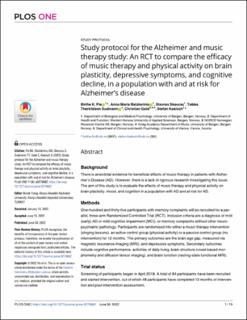| dc.contributor.author | Flo, Birthe Kristin | |
| dc.contributor.author | Matziorinis, Anna Maria | |
| dc.contributor.author | Skouras, Stavros | |
| dc.contributor.author | Sudmann, Tobba Therkildsen | |
| dc.contributor.author | Gold, Christian | |
| dc.contributor.author | Koelsch, Stefan | |
| dc.date.accessioned | 2023-03-07T12:40:23Z | |
| dc.date.available | 2023-03-07T12:40:23Z | |
| dc.date.created | 2022-09-28T12:04:05Z | |
| dc.date.issued | 2022 | |
| dc.identifier.issn | 1932-6203 | |
| dc.identifier.uri | https://hdl.handle.net/11250/3056453 | |
| dc.description.abstract | Background There is anecdotal evidence for beneficial effects of music therapy in patients with Alzheimer’s Disease (AD). However, there is a lack of rigorous research investigating this issue. The aim of this study is to evaluate the effects of music therapy and physical activity on brain plasticity, mood, and cognition in a population with AD and at risk for AD. Methods One-hundred and thirty-five participants with memory complaints will be recruited for a parallel, three-arm Randomized Controlled Trial (RCT). Inclusion criteria are a diagnosis of mild (early) AD or mild cognitive impairment (MCI), or memory complaints without other neuropsychiatric pathology. Participants are randomised into either a music therapy intervention (singing lessons), an active control group (physical activity) or a passive control group (no intervention) for 12 months. The primary outcomes are the brain age gap, measured via magnetic resonance imaging (MRI), and depressive symptoms. Secondary outcomes include cognitive performance, activities of daily living, brain structure (voxel-based morphometry and diffusion tensor imaging), and brain function (resting-state functional MRI). Trial status Screening of participants began in April 2018. A total of 84 participants have been recruited and started intervention, out of which 48 participants have completed 12 months of intervention and post-intervention assessment. Discussion Addressing the need for rigorous longitudinal data for the effectiveness of music therapy in people with and at risk for developing AD, this trial aims to enhance knowledge regarding cost-effective interventions with potentially high clinical applicability. | en_US |
| dc.language.iso | eng | en_US |
| dc.publisher | PLOS | en_US |
| dc.rights | Navngivelse 4.0 Internasjonal | * |
| dc.rights.uri | http://creativecommons.org/licenses/by/4.0/deed.no | * |
| dc.title | Study protocol for the Alzheimer and music therapy study: An RCT to compare the efficacy of music therapy and physical activity on brain plasticity, depressive symptoms, and cognitive decline, in a population with and at risk for Alzheimer's disease | en_US |
| dc.type | Journal article | en_US |
| dc.type | Peer reviewed | en_US |
| dc.description.version | publishedVersion | en_US |
| dc.rights.holder | Copyright 2022 The Author(s) | en_US |
| dc.source.articlenumber | e0270682 | en_US |
| cristin.ispublished | true | |
| cristin.fulltext | original | |
| cristin.qualitycode | 1 | |
| dc.identifier.doi | 10.1371/journal.pone.0270682 | |
| dc.identifier.cristin | 2056301 | |
| dc.source.journal | PLOS ONE | en_US |
| dc.identifier.citation | PLOS ONE. 2022, 17 (6), e0270682. | en_US |
| dc.source.volume | 17 | en_US |
| dc.source.issue | 6 | en_US |

